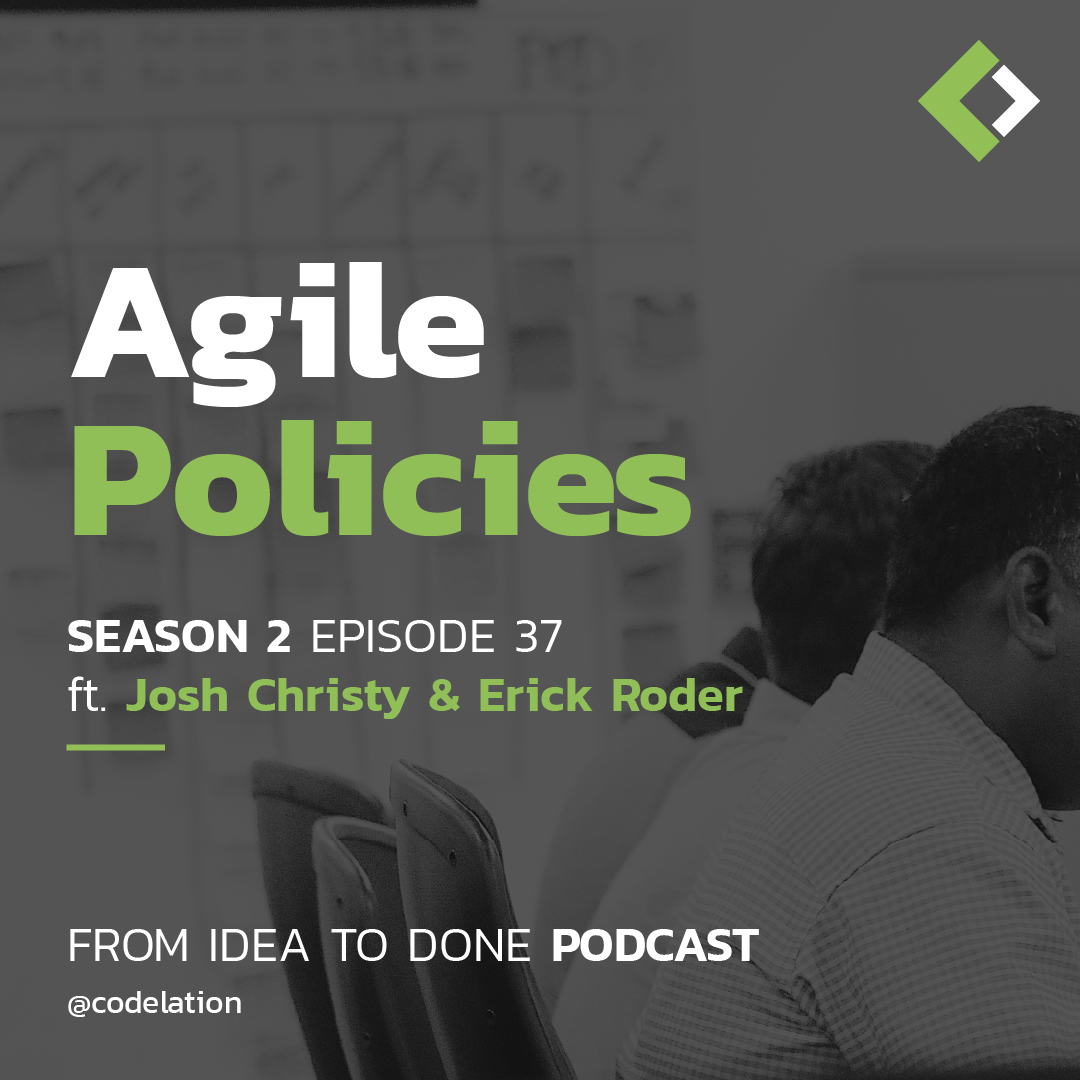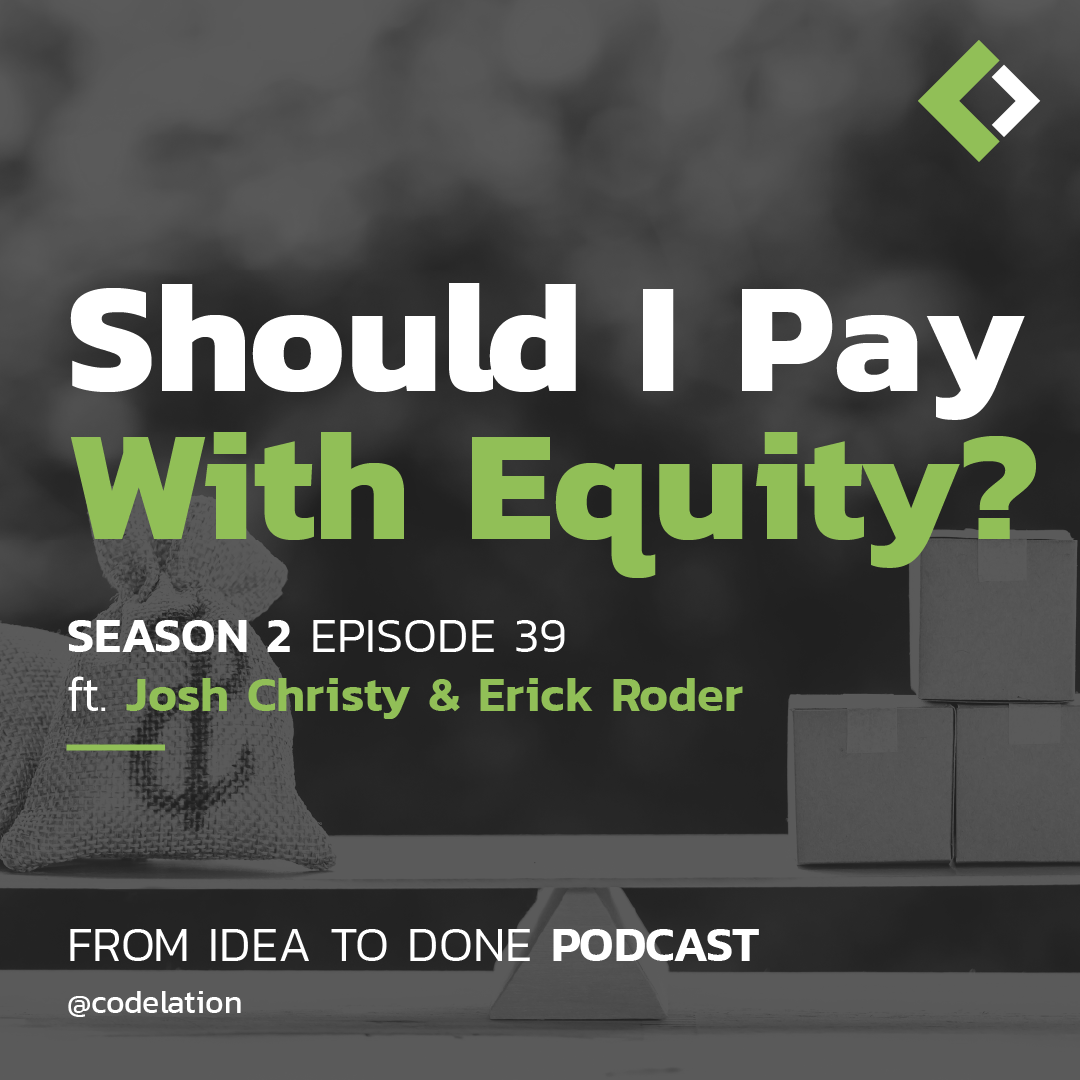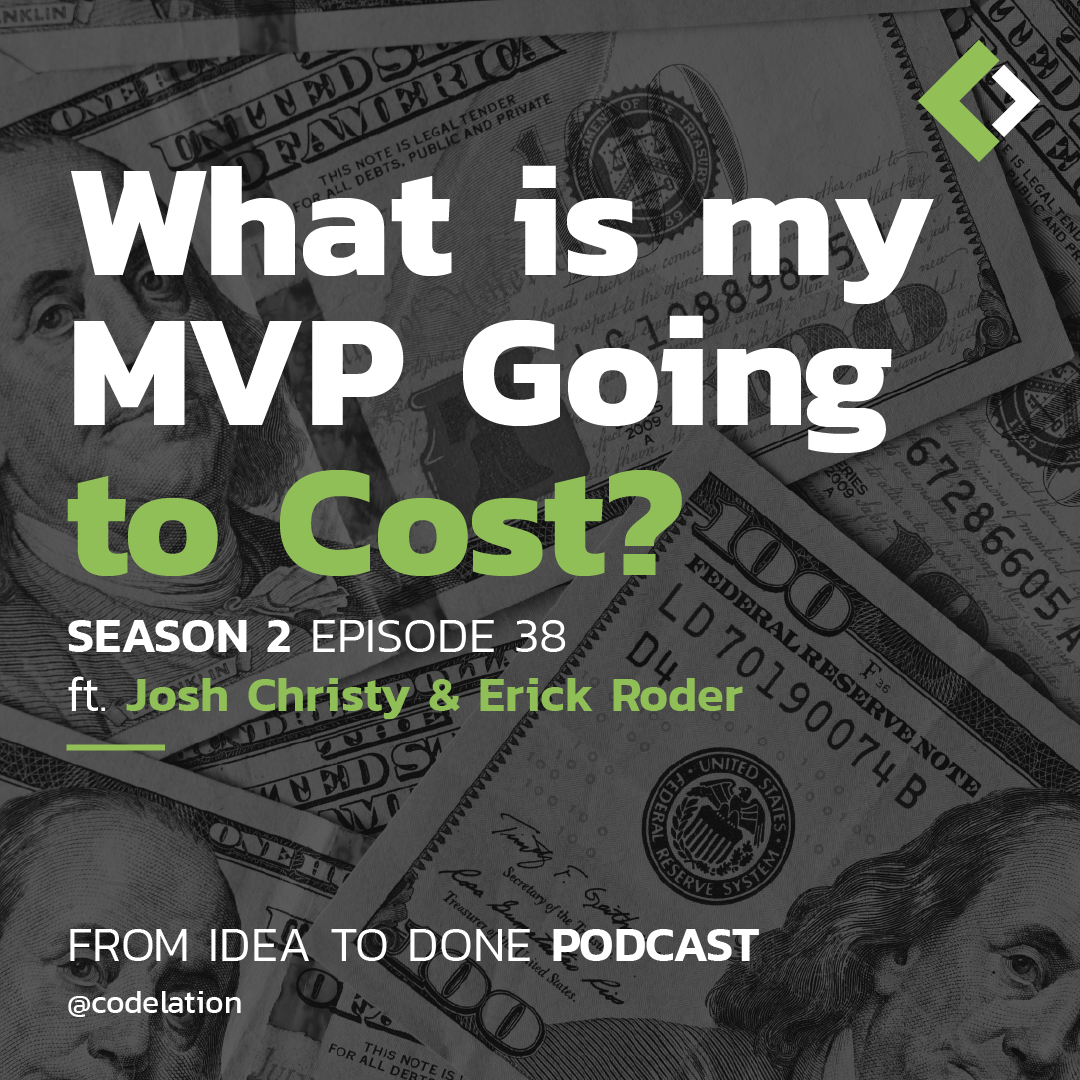What Is My MVP Going To Cost?

Agile Policies
September 15, 2020
Should I Pay With Equity?
September 29, 2020VO: Get ready for your semi-regular dose of random ideas from the guys at Codelation. We like to talk about big ideas companies that are winning, and those that aren't along with current events in our crazy world of software startups. So come along with Erick and Josh, who challenge you to think big, start small and turn your ideas into something on this episode of, from idea to done
Josh: Hey everyone, I'm Josh.
Erick: And I'm Erick, and today's idea is you've got this incredible idea and you have an app in your head, and you're thinking about building an MVP with the developer. What's your afraid of spending too much money? Like what do you do? And so first things first with this MVP was a new acronym to my vocabulary when coming into the world of software development and startups. Can we talk about what an MVP is?
Josh: Absolutely. So it is probably known to you before as most valuable player from baseball, right?
Erick: Exactly.
Josh: All right. Well, in our world, it's known as minimum viable product and MVP highlights on a lot of the right things, but I think has the wrong, um, sentiment to it. You know, you have the words of minimum and viable that that's a terrible way to look at things because minimum is, what's the least amount of effort I can put into it. You know, what can we do to check off the boxes as a, as a development company? Um, it doesn't allow us to really lean into what it should be. And so we've, we've stolen this from, uh, another blog. I know we've referenced it before, but it's called SLC and that's simple, lovable and complete. And if, if you, I think it's a, a smarter bear blog, we'll put it in the show notes here. And if you read the comments on that blog post it's really funny is that it's split almost 50 50 of people saying that it SLC is MVP. Stop trying to create new acronyms for stuff. And the other half are saying, I love it. It means a lot more to me. Um, so I'm, I'm on a, on a side of SLC, simple, complete means more than an MVP, but at the end of the day, it's the same concept.
Erick: I just feel men are like the, the marketer in me does not like the word minimum vial. Like that just doesn't seem good, but we've determined now that simple bullet lovable and complete as a thing, and that we're not talking about Ken Griffey Jr. So, so what is the basic conversations that would kind of start any customer with when they come in for a simple, lovable, complete product?
Josh: Well, typically the customer comes in with a series of features that they want to build, and we need to reframe that into what's the problem? What is the problem we're trying to solve? Why are you trying to solve this problem while you're the right person to solve this problem? What happens if you don't solve this problem and likely in the year 2020, if you don't solve that problem, like, you're probably not going to matter in the, in the real binary sense of it. If you, if you went to the audience and, and said, this is a problem, I'm not going to solve it. I don't think you're going to have anybody that's that's up in arms for it. So, um, there are a lot of times though, that the problems that you you think are having, aren't really the core problems that you're solving. And so it goes back to understanding the, um, understanding the, the audience and how severe frequent is that problem. Because at the end of the day, you, you may end up with something completely different than what you're thinking about.
Erick: And, and we do run into that at a time, like me change, pivot our directions on our builds a lot. And it's really focused on getting to that problem though. And I think that that's something important that a lot of people just kind of miss out on. And so that kind of gets us into our next basic question that everyone has for us is how much is developing this idea again, a cost. And I think that's kind of the hardest thing in the world for us to answer, because there are unlimited variables in the question of like the cost of starting a business. And so how do you approach this question?
Josh: You know, I, I really focus on it from the concept of, um, appetite and resources and appetite. So Eric, you came in with an idea, appetite is, is what are, what is your, your want to solve this problem? You may come in and say, the problem I'm trying to solve is going to revolutionize the marketing industry. And I've got $5 to do it. And I don't know anything about marketing. Um, also I work a day job. Like your resources are limited, those are your constraints. And so time, money, and expertise. Um, at that point, you know, as a development shop are, I should say, you know, not just a development shop, but as a total station, um, should, should we build out anything? Is this better suited as a pitch deck or a wire frame, you know, is, is the point of the MVP to sell it or get feedback? Like, what are we trying to do with solving this problem? And there's, there's a lot of factors that go into this. And ultimately only you can decide what your appetite is to solve a problem, how much time you have money, you know, and what your team's expertise is. And I think it doesn't do anyone, any good for us to put together a big scope doc and, um, put a whole bunch of features together. If, if you don't have the right pieces in place to solve a problem,
Erick: If you're not ready to take the bite, you should not get a 72 ounce steak. And I kind of look at that question differently too. A lot of times our potential customers are just like, they're so excited and the first step that we're going to do it, and we really need to kind of look at it as a big picture, like, and we'll use you as an example. So you wanted to start a software development company seemed like a good idea, 12 years in I'm guessing you spent a lot more and, and like actual millions of dollars in rant and payroll and podcasts equipment, like what was the dollar amount you spent? Did that match what you had in your head 12 years ago?
Josh: Um, no, you know, like 12 years ago I read the four hour work workweek and basically said, how many rounds of golf could I squeeze in each day? Like completely different thought process and not even close, um, to where we're at today. And there's a, I will put this in the, in the notes here on this podcast. There's a great article that ha can't see me, but I got a pyramid up on the screen. And this, this blog post talks about the MVP typically takes the bottom third of the, um, of the pyramid and tries to complete it. And if you look at the pyramid of, you know, um, emotions kind of going top to bottom of enjoyable, usable, reliable, and then the user needs user segments functions. You really, whether you're starting a software development company or you're developing an app, you don't want to take the bottom pass about, you kind of want to take a little slice off of each side of it so that you get all, all of the pieces that dressed in, in your MVP, in your, your SLC. And so I think there's some, some good things to, to glean from our experience with our clients and also from ourselves,
Erick: You know, that's, I, I haven't even heard you talk about that one before, usually a little familiar with the references that you talk about, but I think the example of your company, it's a good idea. The fact that, you know, you have to have a huge appetite, because what if your idea is a Homeland? You know, if you found Facebook, you have to have a crazy amount of appetite because you are going to be spending billions of dollars, your dedicate your entire life. And you have to be basically an honorary doctor in your field to kind of get to that point. And so it's just kind of a different thought process of thinking that, looking at it at like the big picture, instead of just at the minimum, which I just, like I said, I don't like that word to begin with, but do you have any other advice on kind of getting a budget set around your simple, lovable, complete project?
Josh: Yeah. You know, I think a lot of times people look at it and say, I've got, I've got $50,000 to build this thing. And that's, that's a ton of money, no matter who you are and the way they look at it and say, I'm going to put $50,000 towards building the thing. That's a wrong way to look at it because you need marketing, you need sales, you need all sorts of other resources. And so like if your entire, your entire pool is 50 grand, put a milestone together for your development team for you, like whoever you're working with and say, we're going to spend five, maybe 10 grand of that and set expectations for where you're going to get to. Um, a lot of, you know, if you're working with, um, uh, a dev shop, a lot of times there is no solution in five or 10 grand.
Josh: And so how do you, how do you help move your idea forward? Um, with that in mind, you know, maybe that's, uh, an intern, maybe that is a wireframe. Like there's, there's always ways to get there, but don't spend everything in the hopes that you're going to get what's in your head, because there's a lot of misalignment when you start off on something that at least we know about the project is that the start of it. And so think very iteratively think very small scale and get some results. Um, past that point, it's, it's always going to take more of those three resources, time, money, and expertise. You know, there's a kind of joke around running a business of it's going to take twice as long and twice as much as you expect every time. So just plan a cushion in there because it's going to happen.
Erick: Yeah, no, and I think that we've all kind of had some million dollar idea at some point at a bar in our lives, but like the difference between hundred dollar ideas and million dollar ideas, it's really the execution. And so take some time to really dig into your ideas before putting any money into it. So you'd you have any final, final thoughts?
Josh: Yeah. I think I've seen a blog post somewhere too, where like a good idea with terrible execution is worth, you know, it's like a multiplier effect and you can take an okay idea with excellent execution and come out ahead of somebody with a better idea than you. Um, and just really make sure you know about the industry. Not really, really know the problems that they're having. How big of a problem, how severe frequent is that problem? Um, because if it isn't a nagging issue, no one's going to care. And finally, can you execute on it? You know, Eric, remember Friendster? I know Facebook doesn't
Erick: Okay. I have no idea what friends or peers would be at high school. I have no idea. Yeah. I'll have to do a little research on what Friendster is, but you know, this all kinds of goes back to Kenya business, execute on solving a problem. So thank you for listening. I hope you know of a startup that could use our advice and random thoughts. Send them over to correlation.com to hear our next podcast.
Sign up to receive email updates
Enter your name and email address below and I'll send you periodic updates about the podcast.
